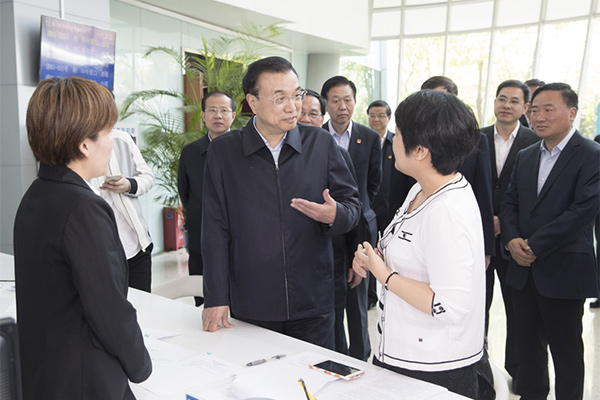
Premier Li Keqiang visits a business service center in the China (Shanghai) Pilot Free Trade Zone (FTZ) on April 10, 2018.
At the State Council executive meeting chaired by Premier Li Keqiang on Sept 12, decisions were made to roll out the separation of business licenses from operation permits nationwide based on its pilot run in Shanghai Free Trade Zone.
“To push forward the reform, we must further ease market access while strengthening supervision,” Premier Li said, adding that the government should fulfill its responsibility in regulation while allowing the market to play a bigger role.
Business licenses and operation permits are both required for starting business operations. Since the business reform in 2014, business licenses alone can grant market access for enterprises. However, they still cannot start their businesses without operation permits.
By the end of 2015, the pilot reform to separate business licenses from operation permits was unveiled in the Pudong New Area of Shanghai, which was decided to be expanded nationwide at the meeting on Sept 12.
The move will remove barriers for enterprise operations after they obtain market access.
It meets both corporate and public needs, and is a necessary part of the reform of our market economy system, Premier Li said.
According to the Premier, the business environment should be further optimized by streamlining market access and enhancing supervision, to create a fair competitive environment for all.
He noted that the reform is actually a shift in the focus of government functions from approval to supervision.
“The reform will help improve the business environment, energize the market and catalyze stronger development,” the Premier said.
It was decided at the meeting that starting from Nov 10 this year, an approach of reduced number of required permits and certificates after receiving business licenses will be applied nationwide to the first batch of some 100 business-related government approval items. Items that are no longer necessary for administrative approval or are eligible for self-improvement through market forces will become approval-free or require registration only.
The practice of notification commitment will be applied to those government review items that need to stay, yet any noncompliance with the permitting requirements can be redressed by government oversight. Under the practice, a market entity shall be approved for business activities when it commits to complying with all the permitting requirements. A company violating this commitment shall have its license revoked and face heavy penalties.
Improved access services will be applied to the government review items concerning public security and public health where notification commitment does not fit. However, efforts will be made to reduce the required materials, streamline procedures, and cut the reviewing time to keep the permitting process transparent and make market access easier for startups and innovative businesses.
The practice of notification commitment and improved access services do not mean the revocation of licenses; they are aimed at making the licensing process faster, more open and transparent.
The public should be well informed of the standards on cutting the reviewing time and improving the approval process, the Premier said, urging more efforts to innovate and strengthen supervision.
This reform of separating business licenses from operation permits should be well-paced according to local conditions, he said, “We must live up to our promise and give market entities and people a greater sense of gain.”
